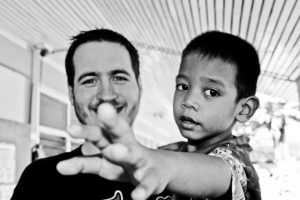What We Call Our Kids: A Gentle Plea for Tact
5 years ago today, my husband and I met our son for the first time.
He was wearing a girl’s shirt and receiving a breathing treatment when I first laid eyes on him. Truthfully, I needed the oxygen at that moment. He took my breath away and has continued to do so with every milestone reached and every goal achieved. The list of what he has overcome in his 9 years of life is astronomical, and I suspect he is just getting started.
So the first time I heard someone here in the U.S. refer to him as “a special needs,” I was taken aback. A special needs what? He’s not a category–he’s my boy.

I called my mom (because even in my 30s, I need her to talk straight with me), and as soon as she picked up the phone I blurted, “Is Andrew a special needs?”
Only when she answered, “He’s Andrew,” did I allow myself to breathe again.
I can’t remember her exact words after that, but essentially we discussed the reality that children who have spent years in an orphanage often encounter obstacles, Global Development Delay at the top of the list.
Now, this is important. Please do not misunderstand the point of my concern.
I–like every parent who has adopted–sat with the required checklist early in our adoption process and put checkmarks next to every health challenge or physical abnormality I was willing to accept in a child. I was and am ready to bring children into my home with every manner of “special need.”
My issue is how we talk about our kids.

I believe unapologetically that no child is immune to God’s good design.
Why? Because the Bible makes no exceptions to “fearfully and wonderfully made” (Psalm 139:14). The moment we speak of a child’s particular challenges with an air of condescension or a disregard for their privacy or personhood, we disrespect the Creator in addition to the creation.
And let’s be honest, whether a child’s challenges have an assigned medical term or not, all children have special needs. From a language delay to a physical abnormality to a deep and abiding hatred for reading, our kids will face challenges, and we–as their parents–will do all we can to help them achieve their goals regardless.
The issue from my perspective is not the obstacles our kids face, but rather the labels we choose to put on them.
Since the day I first heard someone refer to my son as “a special needs,” I have heard it at least a dozen more times in contexts where it is unhelpful or unnecessary. Sometimes it’s said in front of him, and at other times it’s written on a form or included in an e-mail or mentioned in a group.
On one occasion, specifically, I attended a meeting where a director listed the children in her care–my son included–who had “special needs” and then proceeded to share with the room what his needs were without our consent. And he was sitting in the meeting beside me.
So as a mom who loves her child fiercely, here is my one request: Call him Andrew. He needs no modifier. Yes, he has growing and overcoming to do, but then, so do I.